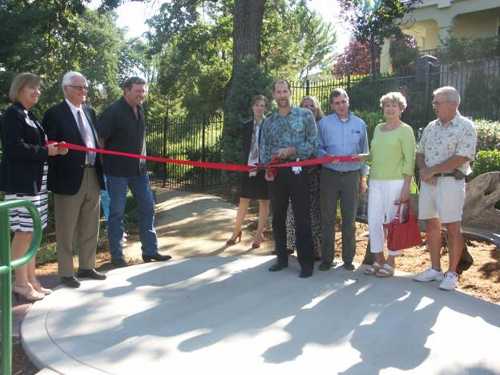- Editor
- Posted On
Ribbon cutting commemorates mobility park completion on Sutter Lakeside Hospital Campus

LAKEPORT, Calif. – Donors, employees and physical therapy patients gathered at the Sutter Lakeside Hospital campus on Aug. 30 to celebrate the opening of the completed outdoor mobility park.
The park will provide a private space for those recovering from illnesses and injuries to master real-world skills, from navigating difficult terrains to redeveloping fine-motor skills under the watchful eye of a physical therapist.
The mobility park allows patients to build their physical skills while developing the sense of confidence necessary to accomplish these tasks in a public environment.
Dr. Martin Brotman, Sutter Health senior vice president of education, research and philanthropy, spoke about the importance that philanthropy will play in the future of health care.
“Philanthropy actually has a Greek origin. ‘Philos’ means ‘loving’ and ‘anthropos’ means ‘man.’ So the word means “love of mankind in general,” Dr. Brotman explained. “And Lake County particularly exhibits this quality.”
Chief Administrative Officer Siri Nelson agreed with Dr. Brotman’s sentiments. “I am just so excited to share this project with you. The mobility park, this space that we’re looking at right now, would still be just grass and trees without your generosity and support. Thank you for believing in this project.”
Director of Rehabilitation Services Joe Prisco introduced a physical therapy patient who attended the ribbon cutting ceremony to guests, adding, “The mobility park will make an enormous impact on so many people for years to come. It provides a higher level of rehabilitation that will help our community members gain the essential level of skills that they need to return to an active, satisfying and happy life.”
Certification of the park is expected to be completed before Oct. 1 and physical therapy patients of Rehabilitation Services at Sutter Lakeside will use the park immediately.





 How to resolve AdBlock issue?
How to resolve AdBlock issue? 




